This article is a sequel to “understanding ethics in engineering and construction” which defined ethic and its influencing factors. It expended the understanding on what ethics and value means in construction and engineering industry. For better understanding, please read it before reading this. This article dives into developing and embedding ethical practice in the industry.
Driving Ethics in the Nigerian Engineering and Construction Industry
To drive ethical behaviour into the engineering and construction industry, two stages are required as recommended by CIOB (2019). The first is doing it legally through legislations. Which the COREN Act (2018) which was signed into law by President Mohammed Buhari in March 28, 2019 substantially addresses. Section 3.4 of the law requires government to give incentives to organisations that comply. The other way is to drive ethical behaviours in morally. This is where values and moral compass come into play. CIOB (2019) calls it the “legal versus ethical” dilemma.
The CIOB and The International Labour Organization (ILO) had called for greater industry collaboration to eliminate unfair labour practices because they identified reward system to have huge influence on ethics. They also advocate and prioritized tackling all forms of illegal recruitment and practices to develop ethics. A recent report; “building a fairer system: tackling modern slavery in construction supply chains” was produced in consultation with NGOs and businesses including the Institute for Human Rights and Business, Amnesty International, Verité and Engineers Against Poverty. The report examines the root causes of engineering and construction industrial slavery, and sets out prioritized actions for moving the industry towards superior transparency.
The CIOB (2019) identified meagre payment practices as an example of poor ethical behaviours within many UK construction supply chains. It undermines both the economic and social reputation of the industry. Prompt payment should not be an exception, but the norm. When it comes to prompt payment in engineering and construction, conventional logic usually breaks down. Unlike in everyday life, where we pay immediately and in full for goods and services, but in engineering and construction, there is always the tendency to pay less than what is due or entirely delay payment. This poor payment practices are a major factor responsible for poor reputation of engineering and construction. Furthermore, s comparatively high levels of insolvencies among its supply chains add to that negative view, while also being wasteful and adding economic and social costs to the delivery of our built environment. Prompt payment is ethical in construction, it breeds collaboration and trust, as well as fostering value-adding activities that enhances both the reputation of all the project stakeholders and the entire industry. The best and global practice is, for all engineering and construction contracts to secure prompt payments for all, not more than 30 calendar days after the day of supply of materials and services.
In all, it pays more to be ethical and ethical organisations are more successful as evidences from Andrew Leigh, author of ‘Ethical Leadership, Creating and Sustaining an Ethical Business Culture’ (2013) revealed. Andrew believes that ethics is as important as cost cutting when it comes to making a business more profitable. Engineers, architects, surveyors, entrepreneurs and other contractors with small businesses of less than ten workers are strongly advised to focus mainly on their clients, ensure transparency to develop customers trust. The sure way to fail in business is to lack integrity, and this is a risk, small engineering and construction businesses must continuously avoid in order to thrive in a competitive built environment. Unfortunately, majority of small businesses rarely have ethical code. And “If an organisation does not have a code of conduct, it is effectively relying on each person to act in accordance with their own personal code of ethics or moral code. This is a risk to the organisation and puts unnecessary pressure on the individual” (Bibb, 2010). Remarkably, organisational culture is the main determinant of people’s behaviour in any project and The CIOB Academy’s PLUS model helps an individual make the right ethical decisions. The PLUS model comprises the following key questions:
P = Policies – is it consistent with my organisation’s policies, procedures and guidelines?
L = Legal – is it acceptable under the applicable laws and regulations?
U = Universal – does it conform to the universal principles / values my organisation has adopted? Does it benefit stakeholders?
S = Self – does it satisfy my personal definition of right, good and fair? Can I be proud of this decision or action?
Whenever the answer to any one of these questions is NO, then your actions may have grave consequences for you or your organisation. As an employee, you are required to seek relevant assistance and guidance before making this decision. Begin with a critical evaluation of all possible scenarios, options and consequences. Where there is no code of conduct in place in your organisation, use this useful and detailed checklist of Bibb’s (2010) 21 questions when faced with an ethical dilemma:
Understanding the Situation
Do I understand the situation?
Have I got all of the facts and information I need?
Are there any legal issues involved?
What is it about the situation that I believe may make it an ethically problematic one?
Have I looked at the situation from the perspective of all those involved?
What is the truth of the situation?
What is my intention?
Making the decision
Have I spoken to all the people involved?
What are the options?
Are there other possibilities that I may not have thought of?
Have I got the courage to do what is right?
How sure am I that this is the right decision?
What are the upsides of this decision for all concerned?
What are the downsides of this decision for all concerned?
Checking the decision
What are the consequences of my decision for all concerned including me, others, the company, shareholders and family and friends?
Is my decision the right thing to do?
Acid test questions
Would I be happy for my decision to be published in the media?
Would I be happy for my friends and family to know about my decision?
Is there any part of me that thinks this decision is wrong or that I am ashamed of it?
If I implement this decision is my conscience clear?
What is the best decision for the highest possible good for all concerned?
All the questions are a useful checklist to follow when engaged with an ethical dilemma, but the most powerful are the acid test ones which calls your personal moral compass into play.
It is very important to note that hospitality is good, but should not be used as cover for bribing. The level of hospitality offered and accepted should be considered. The level of the hospitality, the level of influence of the receiver on the business decision and the way in which it was provided must all be considered to avoid bribe in general. Thus, what level of hospitable facilitation is proportionate and reasonable for your engineering and construction business? As recommended by CIOB (2019), “any facilitation payments, which are payments to induce officials to perform routine functions which they are otherwise obligated to perform, are bribes. And it is very important for hospitality, expenses or gifts whether given or received, or refused, to be fully reported and documented to immediate superiors because transparency is key to avoiding suspicion and building trust”.
Ethical state of the Construction Industry
A survey was conducted among course participants to determine the current state of the construction industry when it comes to ethics. Below are the results of the questions.
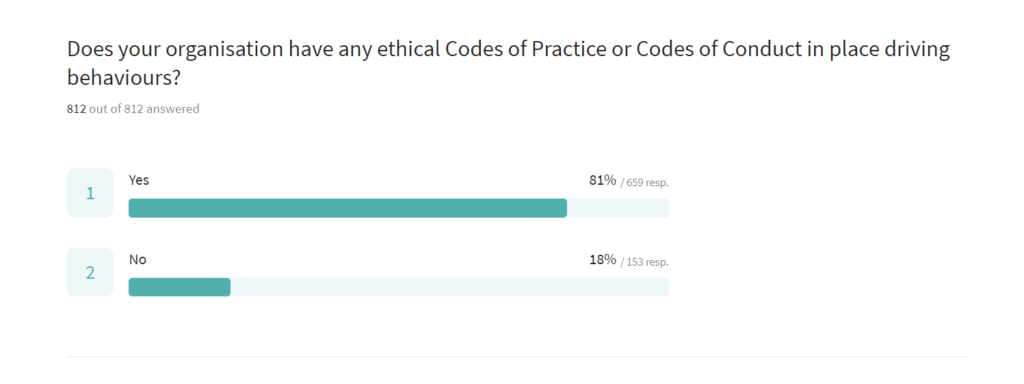
Figure I.
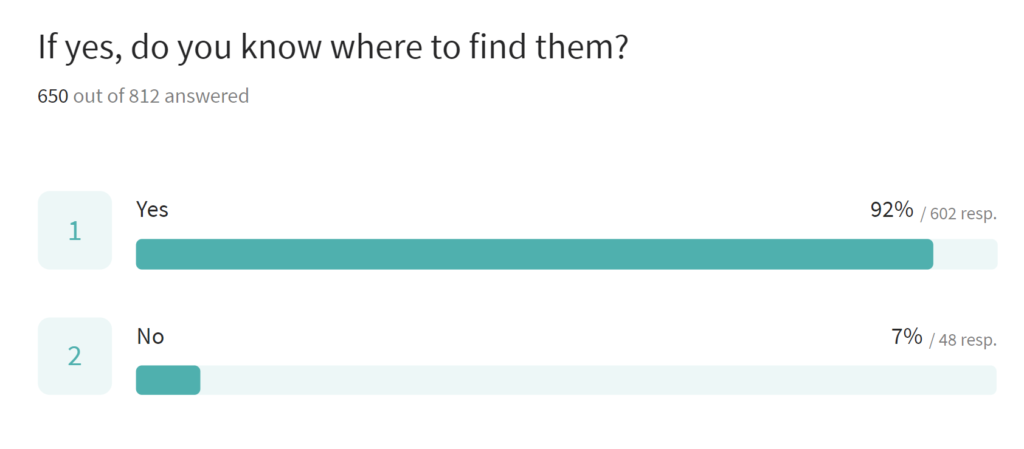
Figure II
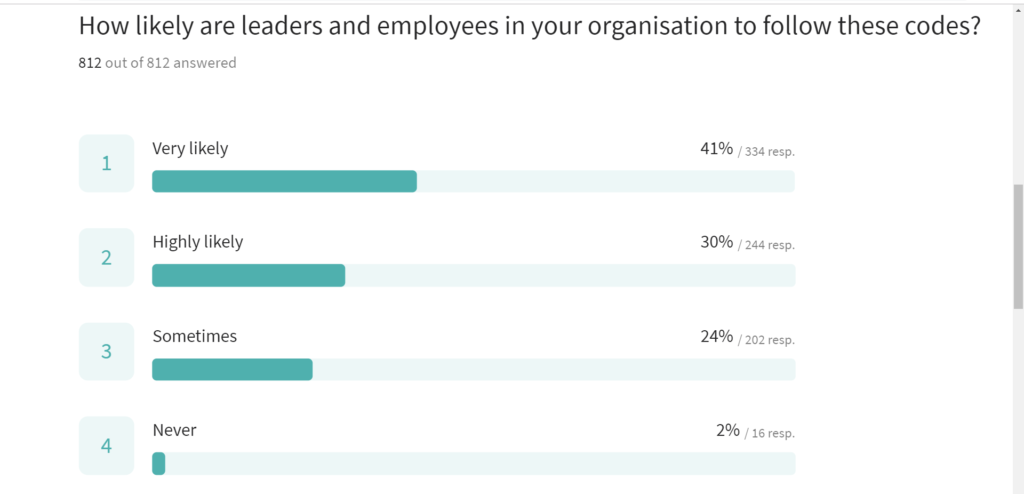
Figure III
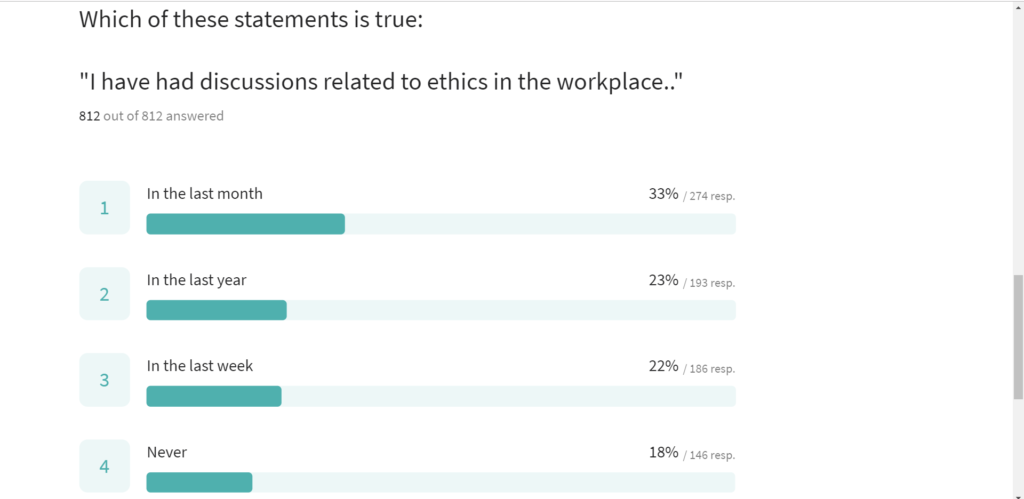
Figure IV
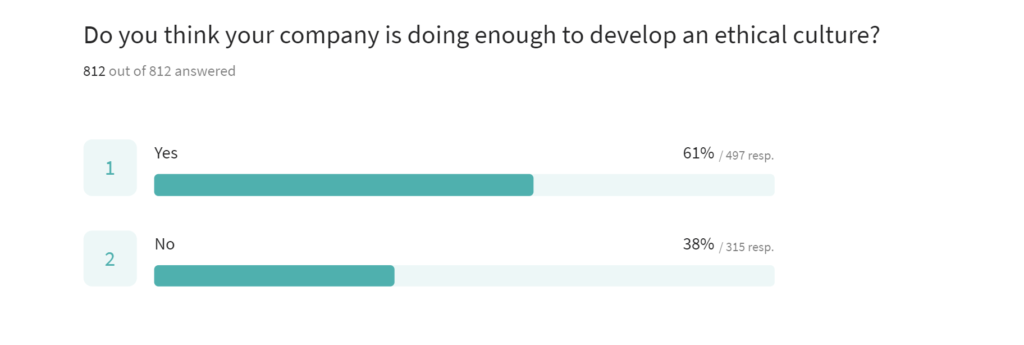
Figure V
At the introduction to this course, CIOB Academy highlighted the emerging challenges with ethical conducts in the industry. Surprisingly, the poll is remarkably positive, though I observed a disconnect. 71% in figure I, believe their organisations follow their ethical codes, yet only 22% in figure IV, have had discussions related to ethics in the workplace in the last week, with 33% and 23% in the last month and year respectively. That is the gap. As engineering and construction is a high decision-making industry, it is my view that ethical discussions at workplace should come up as often as weekly because we are faced with right and wrong choices every day of the week especially onsite. Perhaps, this is why the 38% in figure V believe that enough has not yet been done to develop ethical culture in the industry. Although further study is needed to confirm this. Let us imbibe the culture of discussing ethical issues as regular as they occur in all engineering and construction organisations, irrespective of size, because according to Andrew Leigh, “in order to become an ethical leader, you need to talk about ethics.” And I believe ethical conversations should be as often as ethical occurrences.

